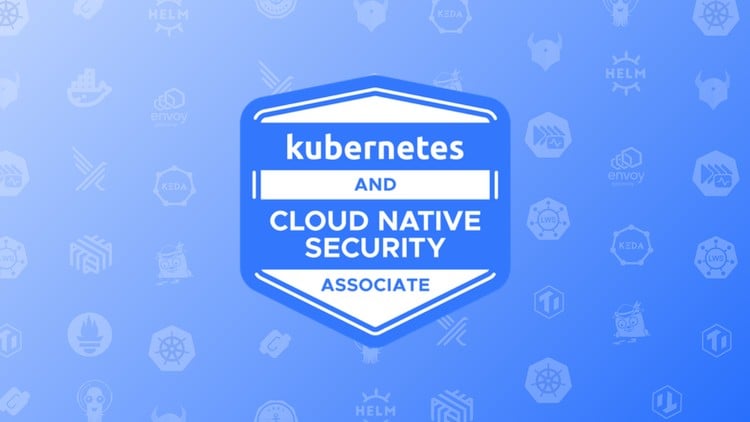
360 questions | KCSA practice exams with explanations | Test your Platform and Kubernetes Security Knowledge
⭐ 4.43/5 rating
👥 2,603 students
🔄 August 2025 update
-
Course Overview: KCSA Practice Exam Excellence
Welcome to the ultimate preparation resource for the Kubernetes and Cloud Security Associate (KCSA) certification. This comprehensive course is meticulously designed to equip you with the essential knowledge and test-taking strategies required to excel in the KCSA exam. Comprising an expansive bank of 360 meticulously crafted questions, this set of practice exams goes beyond mere assessment, offering detailed, insightful explanations for every single answer. This approach ensures that you not only identify incorrect responses but also deeply understand the underlying security principles and best practices. With a stellar 4.43/5 rating from over 2,603 students, this course has proven its effectiveness and value within the cloud-native security community. Regularly updated to reflect the latest changes and best practices, including a significant August 2025 update, you can be confident that your preparation is current and highly relevant. Dive deep into critical areas of Platform and Kubernetes Security Knowledge, solidifying your understanding and boosting your confidence for exam day.
-
Requirements / Prerequisites: Building Your Foundation
To maximize your learning experience and effectively leverage the practice exams, a foundational understanding of specific concepts is recommended. While this course focuses on validating and expanding your security knowledge, it is beneficial to have: a basic grasp of Kubernetes core concepts, including pods, deployments, services, and namespaces; a general familiarity with cloud computing fundamentals, such as Infrastructure as a Service (IaaS), Platform as a Service (PaaS), and the shared responsibility model in a cloud environment; proficiency with Linux command-line operations, as many Kubernetes and cloud security tasks involve interacting with command-line tools; and at least a conceptual exposure to general information security principles like least privilege, network segmentation, and threat modeling. No advanced programming skills are strictly required, but a logical and problem-solving mindset will undoubtedly aid in dissecting complex security scenarios. Most importantly, a commitment to dedicated study and review is the ultimate prerequisite for success.
-
Skills Covered / Tools Used: Mastering Cloud-Native Security
This practice exam series is structured to rigorously test and enhance your capabilities across a wide spectrum of critical Kubernetes and cloud security domains. You will effectively practice and deepen your understanding of Kubernetes API server security, including authentication, authorization (RBAC), and admission controllers to enforce security policies. Proficiency in implementing and evaluating Pod Security Standards (PSS) and understanding the legacy Pod Security Policies (PSP) will be a key focus. Furthermore, you’ll tackle complex scenarios involving Kubernetes network policies to isolate traffic effectively within your clusters. The course also covers advanced topics like secrets management within Kubernetes, secure configuration of etcd, and the critical aspects of supply chain security, encompassing image scanning, signing, and vulnerability management for container images. Beyond Kubernetes-specifics, you’ll reinforce your knowledge of broader cloud security fundamentals, including Identity and Access Management (IAM) strategies, secure virtual networking, and data encryption at rest and in transit across major cloud providers. Conceptually, you’ll be interacting with security considerations around tools like
kubectlfor cluster management, analyzing outputs from various container scanning tools (e.g., Trivy, Clair), and understanding the application of cloud provider-specific security services like AWS IAM, Azure RBAC, and GCP IAM. The practice exams will simulate real-world security challenges, preparing you to apply best practices in auditing, logging, and hardening your entire cloud-native platform. -
Benefits / Outcomes: Your Path to KCSA Certification & Expertise
Upon completing these practice exams, you will be exceptionally well-prepared to tackle the official KCSA certification exam with a high degree of confidence. The primary outcome is to help you successfully pass the KCSA certification, validating your specialized expertise in Kubernetes and cloud security. Beyond certification, you will significantly solidify and expand your advanced knowledge of securing cloud-native environments, moving beyond theoretical concepts to practical application. The detailed explanations for each question will empower you to effectively identify and close knowledge gaps, transforming weaknesses into strengths. You will develop a more strategic and holistic approach to addressing complex security challenges in highly dynamic Kubernetes and cloud deployments. This enhanced skillset will directly boost your career prospects, opening doors to advanced roles in cybersecurity, DevOps, DevSecOps, and cloud engineering, demonstrating your commitment to continuous learning and professional development in a rapidly evolving field. Furthermore, the insights gained will allow you to contribute more effectively to securing your organization’s critical infrastructure.
-
PROS:
- Comprehensive Question Bank: 360 high-quality, exam-aligned questions covering all KCSA domains.
- In-Depth Explanations: Every question includes detailed explanations, ensuring thorough understanding, not just memorization.
- Current & Relevant: Regularly updated content, including the August 2025 refresh, aligns with the latest exam objectives.
- Proven Effectiveness: High student ratings and strong enrollment numbers attest to the course’s quality and success rate.
- Self-Paced Learning: Flexible format allows you to study at your own convenience and pace.
-
CONS:
- Theory-Focused: Primarily an exam preparation tool; it offers limited hands-on lab exercises for practical application beyond conceptual understanding.